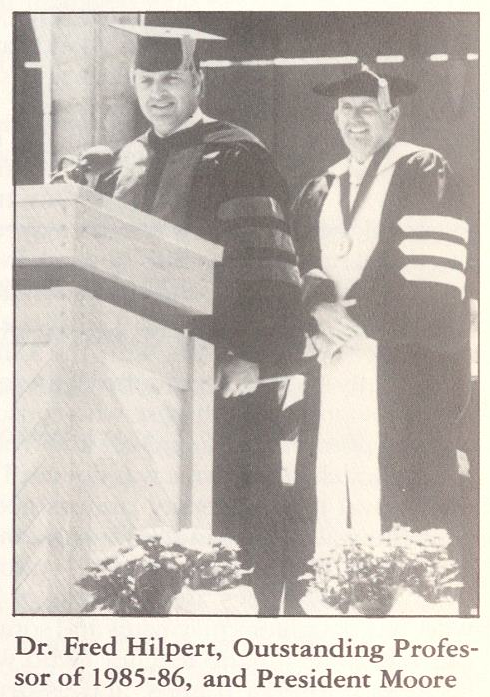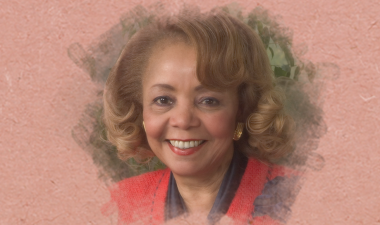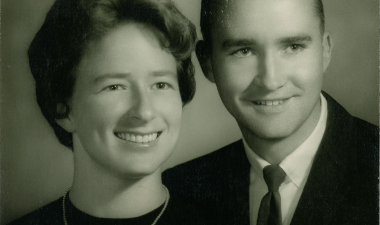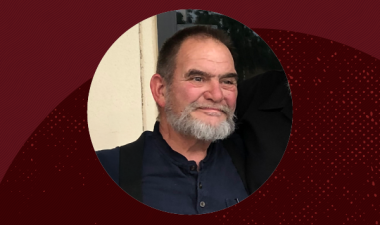Whether it’s the faint scent of his pipe in his office or the KCSS studio, the structure of the Department of Communication Studies or the vibrancy of the California Faculty Association (CFA), Fred Hilpert, who recently passed away at 83, lives on at Stanislaus State.
A communication studies professor from 1977-2011, Hilpert served as department chair, helped create the Communication Studies Department, co-founded the University’s chapter of the California Faculty Association and was coordinator of the Faculty Mentorship Program when it launched in 1987.
He retired for less than a year, returning in 2012 as one of the founding creators of Extended Education’s Bachelor of Arts in Social Sciences (BASS) program.
His name will live on, as well. His family has established a scholarship in his name to help a first-generation communication studies student in need every year.
“He was a workaholic and cared about the institution,” said colleague and friend, Professor Nancy Burroughs. “He retired and thought he’d spend his time fishing. For six months he fished, but he couldn’t stop thinking about creating programs.”
Hilpert’s failing health was a contributing factor in ending his tenure at the University, which lasted more than 40 years.
In that time, he left an impression on fellow faculty and students alike.
“He’s just been a pillar of the campus, part of the early days and really establishing a grassroots orientation at Stan State of putting students first and wanting to hire and work with faculty who wanted the students to be successful,” said Burroughs, who arrived in 1998. “He also wanted faculty to have a say in how academics were organized.”
“He mentored every student who reached out to him,” said John Sumser, who succeeded Hilpert as department chair and as director of BASS. “At the end of his life, in our phone calls, he would tell me about the graduates who had gone on to higher education or successful careers. It was the way he measured our success.”
Hilpert hired one of his former students, Greg Jacquay, to run KCSS and encouraged him to pursue master’s and doctorate degrees. He also hired him as a lecturer to teach public speaking when Jacquay began his master’s program.
“Of all the faculty I had, Fred treated me most like a human being,” Jacquay said.
Hilpert insisted students weren’t kids, but young adults. Still, his favorite catchphrase was, “Go get ‘em, kid,” Burroughs laughed, remembering he always said that to her.
“Fred had a big personality,” said Communication Studies Professor Vickie Harvey. “He knew a lot. He shared a lot. He was bigger than life. He was always supportive, encouraging.”
Still, Harvey and Burroughs remember disagreements with Hilpert. Both said what they most remember is that Hilpert respected them for speaking their minds and never held a grudge.
Hilpert transformed the Organizational Studies Program into Communication Studies and always looked for ways to expand the program. Jacquay credits him with physically moving the department from Bizzini Hall to Degrasso-Bava Hall and setting up the KCSS studio. That same mindset led him to help create BASS.
Burroughs co-taught communications classes with Hilpert and then taught BASS social science courses with him. Harvey said she began teaching in the first BASS cohort.
Jacquay, too, teaches a BASS course, not because he owed it to Hilpert, but because there was a need. Of the many lessons he learned from his mentor, it was to be willing to fill a need.
“Fred was nurturing from the get-go,” Jacquay said. “He didn’t prejudge you. He’d introduce you to the right people, find out what you wanted to do, then follow up and check in on you.”
Hilpert was twice named Outstanding Professor of the Year, and his reach extended beyond his classroom and the Communication Studies Department.
“I can’t even remember how we met,” Professor of Politics and Public Administration David Colnic said. “We were not in the same department. He was no longer in a leadership role in the Academic Senate or CFA when I started that. We talked about the ideals for the campus and how to make our campus realize its full promise. He always had this make-things-better attitude about him.”
It wasn’t just talk. Hilpert acted.
“Fred was a very strong and confident man, but not self-centered, never an egoist,” Sumser said. “He wanted what was best for those around him rather than what was best for himself.”
That teamwork carried over from his time as a scholarship baseball player at the University of Washington and as a Marine, who landed in Vietnam in 1964.
“Being a Marine led to Fred’s recognition and appreciation of what was beautiful in life, what was to be revered,” said Patricia Hilpert, his wife of 35 years.
He displayed the same traits to his family that his colleagues saw.
“He always valued the importance of family and friends, as well as the graciousness to help other people around him,” Adam Hilpert said at his father’s burial service. “I remember hearing many times as I grew up, ‘You can only be as successful as the people you have around you.’”
Fred and Patricia loved spending time with their children and grandchildren, watching as they pursued their interests or teaching them his love of fishing. Their home and Lake Tahoe cabin were filled with family photos.
“Family photos and scrapbooks line the main bookshelf in his study, chronicling everything from his days as a Marine to coaching Little League Baseball, and theses written by former students with handwritten notes thanking Papa for his contributions to their academic success,” granddaughter Michaela Pernetti said in her eulogy.
Also lining the shelves are photos of Fred and Patricia’s travels across Europe, Mexico and Hawaii, and cherished trips to military reunions. Hilpert especially enjoyed frequent family trips to Bodega Bay.
“Papa was a collector, an archivist, and he has made it abundantly clear that he found the most value and joy in memories with the people he loved,” Pernetti said.
Give to the Dr. Fred P. Hilpert Memorial Scholarship Fund to Honor Dr. Hilpert




